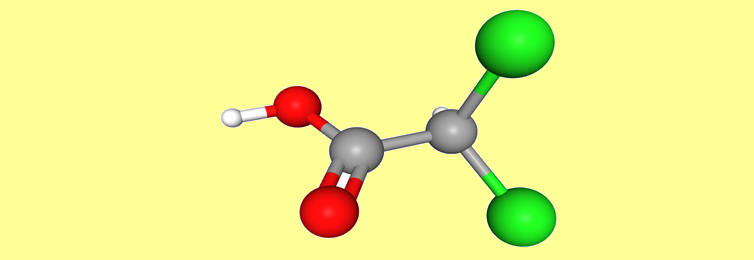INTRODUCTION
Dichloroacetic acid is an organochlorine compound and a corrosive liquid with ammoniacal odor. Its natural occurrence is in seaweeds.
The compound is a versatile chemical reagent. It also possesses medicinal properties and is used as such to treat lactic acidosis, whereby it stems production of lactic acid. It is also employed as a disinfectant.
Manufacture
Dichloroacetic acid is commercially produced as a by-product in chlorination of acetic acid, the main product being chloroacetic acid.
| Synonyms | Bichloroacetic acid 2,2-Dichloroacetic acid |
| CAS no. | 79-43-6 |
| EINECS no. | 201-207-0 |
| Molecular formula | C2H2Cl2O2 |
| Molecular weight | 128.95 |
| Structure |  |
Applications
| Medicinal | As an astringent. Its salts are used as drugs in inhibition of the enzyme Pyruvate Dehydrogenase Kinase. |
| Pharmaceutical | Dichloroacetic acid forms a starting raw material in the manufacture of API Chloramphenicol. |
| Agrochemical | The dihalogenated acid is a key intermediate in production of the herbicide Dichlormid. |
| Other Vital | The compound acts as a detritylation agent in nucleic acid syntheses. It also finds application in peptide production. |
SPECIFICATIONS
| Test | Unit | Specification |
|---|---|---|
| Appearance | – | Clear colorless to light yellow liquid |
| Water by KF | % w/w | Max 0.05 |
| Assay by titration | % | Min 99.0 |
| Assay by derivative GC | % | Min 99.0 |
| Impurities by GC: | ||
| 1. Chloroacetic acid | % | Max 1.0 |
| 2. Trichloroacetic acid | % | Max 1.0 |
STORAGE
Product is stored at ambient temperature.
PACKING
40 kg & 250 kg HDPE drums.
ExSyn offers the product on commercial scale and welcomes enquiries. No matter the quantity you need, our exceptional quality and service will make ExSyn your supplier of choice! If you need any additional information or SDS, please get in touch with us.
Iodine is anon-metallic, dark-grey/purple-black, lustrous, solid element. It is the heaviest and the rarest of stable halogens that can be found on the crust of earth.About fifty percent of all iodine produced and manufactured worldwide is used to form Organoiodine compounds. Iodine is an important element for many health-sustaining processes and essential for human thyroid health.
The product, acronymed Oct-NBE, is an organic compound with a cyclic ring system and a 8-membered hydrophobic chain. The structure renders the chemical special properties leading to its applications in diverse fields.
Nicotine is a hygroscopic, colorless to slight yellow, oily liquid, that is readily soluble in alcohol, ether or light petroleum. It is widely used recreationally as a stimulant and anxiolytic.
The product, acronymed ETD, is an organic compound with a fused bicyclic ring system and an ethylidene group. The structure renders the chemical special properties leading to its applications in diverse fields.
Sodium perchlorate monohydrate is the inorganic compound with the chemical formula NaClO4•H2O. It is the common existence form of sodium perchlorate, which can gradually absorb water in the air to form the monohydrate. Sodium perchlorate monohydrate is white rhombic crystal which is highly soluble in water and in alcohol. Its capacity to undergo redox reactions, liberating oxygen atoms, has been harnessed in the preparation of specialty chemicals, including pharmaceutical intermediates and fine chemicals.
Triphenylphosphine is a common organophosphorus compound that is frequently abbreviated as PPh3 or Ph3P. It is widely used in organic and organometallic compound synthesis because it is an effective reducing agent as well as a neutral ligand. At room temperature, PPh3 crystals are relatively air-stable and colourless.
Potassium chlorate holds significant importance across various industries due to its diverse applications. This white crystalline compound has been utilized for centuries as an essential ingredient in the production of matches, fireworks, and explosives, owing to its ability to release oxygen upon decomposition.
Podophyllotoxin is a non-alkaloid toxin lignan extracted from the roots and rhizomes of Podophyllum species. It is an organic heterotetracyclic compound that has a Furonaphthodioxole skeleton bearing a 3,4,5-trimethoxyphenyl substituent.
Octadecylphosphonic acid (ODPA), a versatile chemical compound, serves as a surfactant and dispersant in applications spanning coatings, lubricants, and corrosion inhibition. With its hydrophobic octadecyl chain linked to a phosphonic acid group, it excels in surface modification, boosting adhesion in metal surfaces.
